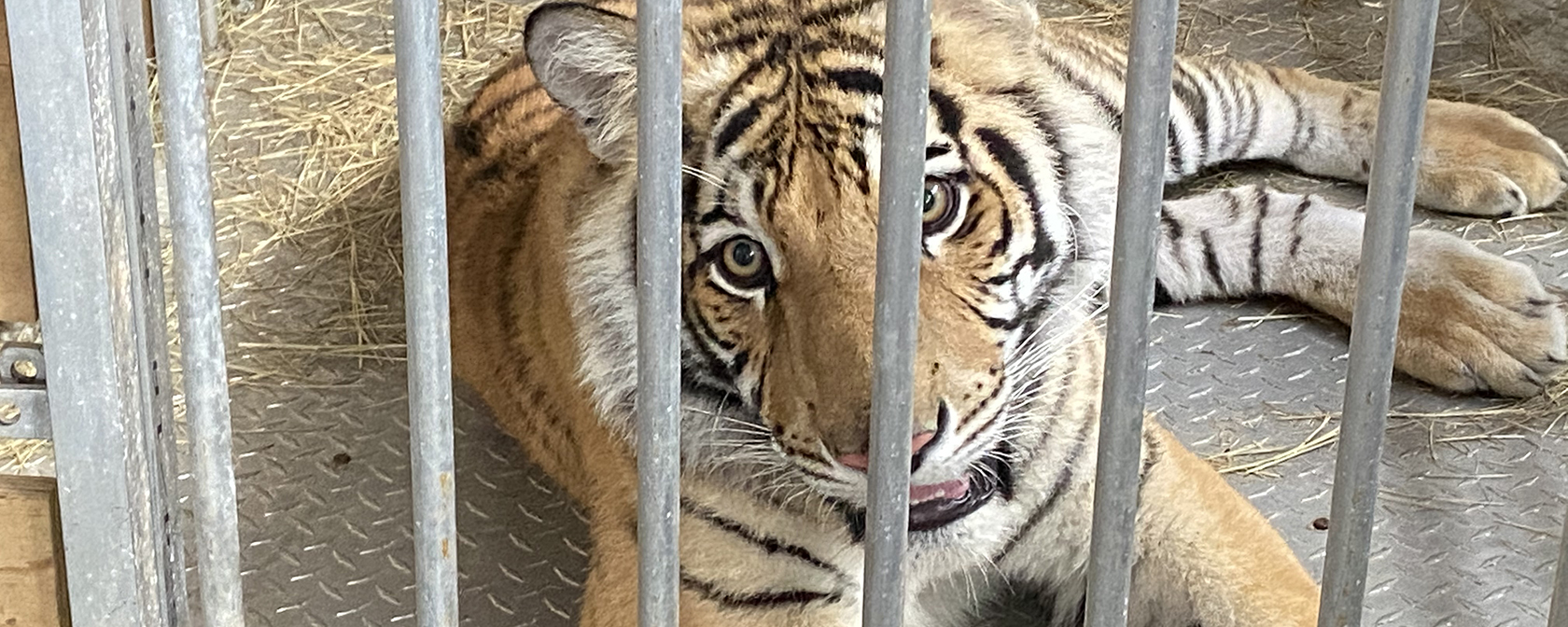By Sara Amundson and Kitty Block
Update 12/20/2022: President Biden signed the Big Cat Public Safety Act into law!
In a major advance in our long fight against the abuse of captive big cats, the U.S. Senate just passed the Big Cat Public Safety Act (H.R. 263/ S. 1210), a bill we have championed for years because it prohibits keeping big cats as pets and also bans contact between big cats and the public. The U.S. House of Representatives passed the bill in July by a robust bipartisan vote of 278 to 134, and now the Big Cat Public Safety Act heads to the White House for President Biden’s signature. Earlier this year the president issued a statement supporting the legislation, so we expect to see him sign it without hesitation.
Our undercover investigations have helped expose the abuse of big cats in the U.S. This all starts with the breeding of big cats to produce cubs, who are removed from their mothers at birth. They are passed around for photos and profit, then discarded after a few months when they become too large and dangerous to handle. It then gets even worse for them, as they are warehoused in cramped cages at roadside zoos and pseudo-sanctuaries, killed to make space for new animals, or kept as pets in backyard cages throughout the country.
With so many big cats ending up in the hands of unqualified people, it’s no surprise that emergency responders and local law enforcement agencies have been forced to deal with the inevitable escapes and attacks. Since 1990, more than 400 dangerous incidents involving captive big cats have occurred in 46 states and the District of Columbia. Five children and 19 adults have been killed, and hundreds of others have lost limbs or suffered other often-traumatic injuries.
India, Elsa and Loki, former “pet” tigers now living at Black Beauty Ranch—which is a Texas sanctuary run by the Humane Society of the United States—embody what has happened to many big cats in this country. Loki arrived in February 2019 after being found in an abandoned Houston home where he was living in a cage so small he could barely move. In 2021, the Bexar County Sheriff’s office seized Elsa after responding to a call about a crying animal and finding the 6-month-old tiger outdoors in freezing temperatures and wearing a harness. Just a few months later, authorities rescued India after a viral video showed him wandering the streets of a Houston neighborhood.
Today’s historic win has been a decade in the making, and results from our broad effort to address the exploitation of big cats by every means available. We supported efforts to pass laws banning the private possession of big cats and other dangerous wild animals in states such as Ohio, which passed a law following the 2011 Zanesville incident where a man released his menagerie of 38 big cats and a dozen other wild animals. We worked with legislators in Indiana, Nevada and Virginia to pass bans on public contact with big cats and other wild animals. And we successfully fought repeated efforts to reverse a ban on public contact with big cats in Kansas. But a more comprehensive federal law was necessary. This is a nationwide problem and demands a nationwide solution to interrupt the cycle of abuse for big cats and to keep the public safe.
Congress considered the Big Cat Public Safety Act in several previous sessions. Our consistent advocacy built awareness of the problem among legislators, leading to a successful House vote in the 116th Congress, and in the actions taken this year by the House and Senate. We could not have reached this point without the commitment and hard work of Sens. Richard Blumenthal, D-Conn., and Susan Collins, R-Maine, co-leads of the Senate bill, S. 1210, who were essential to achieving today’s victory in the Senate and Reps. Mike Quigley, D-Ill., and Brian Fitzpatrick, R-Pa., the co-leads of H.R. 263, who helped bring about the House votes in the 116th and 117th Congresses. House Natural Resources Committee Chair Raúl Grijalva, D-Ariz., and Senate Environment and Public Works Committee Chairman Tom Carper, D-Del., helped advance the bills in their respective chambers.
Our campaign attracted the support of roughly 90 official endorsers, including many law enforcement organizations and officers, whose voices were integral as they are on the front lines of the big cat crisis, tasked with response when these dangerous situations become deadly.
When signed into law by President Biden, the Big Cat Public Safety Act will sound the death knell for the cub petting industry, and eliminate the terrible risks posed by the private possession of such animals. By closing the door on cub petting and the era of private citizens keeping big cats inappropriately, we’re making the country safer, better and kinder for all. It couldn’t happen fast enough.
Kitty Block is CEO of the Humane Society of the United States.




